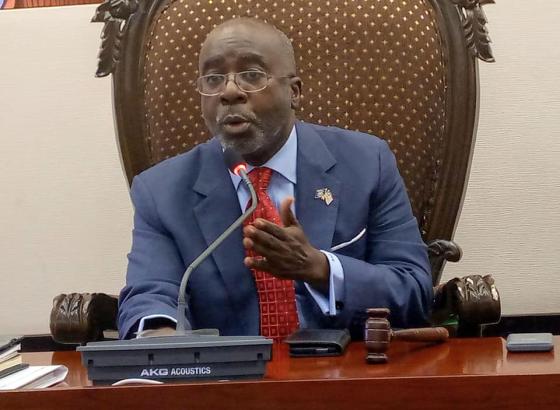Deputy Speaker Criticizes Senate

House Speaker J. Fonati Koffa
The Deputy Speaker of the House of Representatives, Cllr. J. Fonati Koffa has described the decision by the Senate to downplay the implementation of the Truth and Reconciliation Commission report as a slap in the faces of victims of the war.
The latest Senate recommendation follows the earlier stance of its leadership, after consultations with legal practitioners, politicians and civil society actors.
In their communication, the Senators informed President George Weah of their desire to establish the Transitional Justice Commission (TJC) , to review the final report of the TRC and the conflicts regarding the report, as well as performing other responsibilities.
However, the Senate advised the President not to establish an economic Crimes Court, which is intended to prosecute companies, institutions or individuals who have allegedly committed economic crimes during the civil crisis.
This position of the Senators is in sharp contradiction of their previous stands which support calls for the court.
But for Deputy Speaker Koffa, the Senators’ decision is not just bad, but intends to undo the work of the TRC commissioners.
According to Cllr. Koffa, while there remains a challenge, it is unnecessary to have a commission that will go back and deal with all the different issues that the TRC has already dealt with.
“We should not go back to auditing the TRC and its rationale. If I were to do a TJC, it would be a commission to set up a roadmap on how the TRC report will be implemented,” Rep. Koffa explained. “The TRC report has become internationally acceptable as a body of work that categorizes and contextualizes impunity in Liberia. So, to go two steps back to audit the TRC, we either throw it out or come out with a new process together. But this will not be doing justice to the war victims.”
Cllr. Koffa argued that the concerns about constitutional backing of the war crimes court should not be the reasons that the TRC report should be scrapped, rather, finding ways to solve it.
He added while there remain legal and structural challenges, it is however not impossible to put the requisite structure together to host a war crimes institution, given a separate jurisdiction.
“To go back and deal with all those different issues will not help you in the sense that the issue regarding the constitutionality of setting up a Liberian war crimes court, the challenges are already here and identified. So if the challenge means we cannot have the court locally, then we can find an international framework which is the ICC or a hybrid court.”
The Senate argument
The Senate’s argued that it remains conscious about the constitutional and other legal inhibitions to establishing a war crimes court on Liberian soil, particularly the effect of the August 2003 Act of the Legislature, which granted general amnesty from all civil and criminal liabilities to all persons who participated in the civil crisis from December 1989 to August 2003.
The Senate also cited Article 21(a) of the Liberian Constitution, which prohibits the enactment of ex post facto laws and how this provision could be reconciled with a repeal of the August 2003 general amnesty law. And Article 97 of the Constitution, which granted amnesty for all acts done or offenses committed during the regime of the People’s Redemption Council (1980 to 1985), particularly when the TRC recommended retributive justice to be carried out as far back as January, 1979.
Furthermore, the Senate states that Article 2 of the Constitution, which provides, among other things, that treaties found to be inconsistent with the Constitution shall, to the extent of the inconsistency, be void and of no legal effect.
It added that Section 4.2 of the Criminal Procedure Law, which provides for a time limitation of five (5) years to prosecute felonies (the economic crimes) in light of the fact that the Liberian Government became aware of these economic crimes in 2009 when the TRC Final Report was published.
In the communication, the Senators called on President Weah to take into consideration that the Constitution provides that the Supreme Court has the final appellate jurisdiction in all cases, both of law and facts.
“Ordinarily, since such economic crimes are national or domestic crimes against the State and not international crimes, they could have been prosecuted in courts, such as Criminal Court “C” and the First Judicial Circuit Court, which are already in existence in the country,” the senators wrote.
‘Think about the victim’
Cllr. Koffa further said that the issue of the government apologizing to the Liberian people is necessary, but it is not a front to one administration. It is multi-administrative, and the issue of the victims has not been prioritized.
“I believe it is critical in this quest for the TRC. Most people are just concerned about the TRC. We all should be sorry that it has been over twelve years since the TRC report was submitted and nothing has been done about it.
Lots of people just look at punishing the perpetrator, but we need to create a mechanism where victims of the war, like child soldiers, would be compensated. They are zogoes because of what happened to them; their entire future was destroyed.
Meanwhile, Cllr. Koffa has called for support for the LACC to fight economic crimes since it is an ongoing issue.
